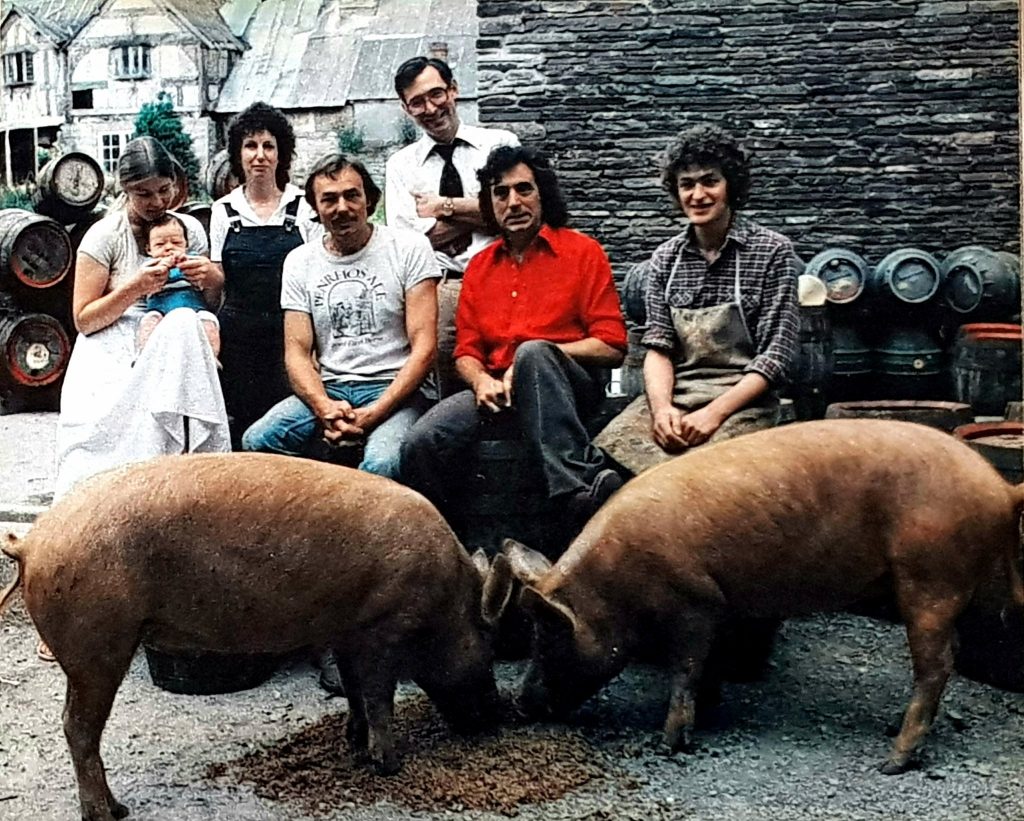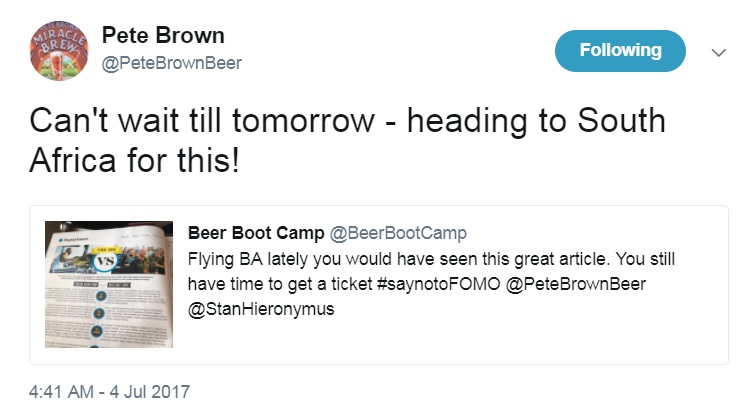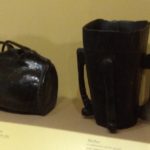Sad news to start with. We lost one of the greatest comedians I have known in my life – as well as a figure at the early end of this wave of good beer culture. The role of Terry Jones of Monty Python, along with co-conspirator Eric Idle, in bringing real ale to the attention of the British public during the mid-1970s was recorded by Boak and Bailey in their fabulous book Brew Britannia, excerpts of which were posted on their blog for the 100th edition of the dear departed Session:
This should not have come as a surprise to anyone who had seen Palin in the famous 1974 ‘travel agent’ sketch in Monty Python’s Flying Circus, in which Eric Idle delivers a ranting monologue with repeated disparaging references to Watney’s Red Barrel. Of the two, Terry Jones was the more enthusiastic about beer. When his accountant, Michael Henshaw, introduced him to another of his clients, Richard Boston, they entered into partnership on two projects. First, an ‘alternative’ magazine, The Vole, to be edited by Boston; and second, a brewery, which they initially intended to open in Berkshire.
I love that an accountant was involved with getting him going on good beer. Roger Protz remembered him, his brewery and a particular moment before the press with this tweet:
I remember it well. Terry Jones… didn’t want to pose sniffing the beer. He suggested pouring it over his head. He had to do it twice as the incredibly old-fashioned Fleet Street photographers in their trilbys were not ready with their cumbersome cameras.
My favorite remembrance today was from Stephen Fry: “Farewell, Terry Jones. The great foot has come down to stamp on you.” Lovely.
And from a slightly earlier point in beer culture, David Sun Lee shared this Youtube vid for Carling Black Label noteworthy for its significant Mabel content. My mother’s cousin Mabel married a Glasgow pub owner and mailed them Canadian “Hey Mabel, Black Label!” related breweriana when I was a toddly kid in the 1960s.
In corporate news, all is not so real. We learn from Matt that Australia’s Lion Beer, a Kirin subsidiary, is consolidating its “Little World Beverages” arm to include New Belgium, Little Creatures, Panhead, Fourpure and Magic Rock. And Atwater Brewery of Detroit is selling to Molson Coors under an agreement that sees all of its brewing assets, taprooms and a biergarten moving to Molson Coors under its craft beer division Tenth and Blake. Adjust your buying preferences accordingly.
Speaking of shadowy corporate goals, I found an email from Beer Connoisseur webzine in my spam folder which had, miracle of miracles, a softball Q+A with well-known promoters Jim Koch and Sam Calagione which included this sad statement of where we are:
Jim: Who would have thought a few years ago that The Boston Beer Company would play in hard seltzer? Truly was an innovation we explored as an alternative for drinkers – and we’re happy we took the chance on it when we did as one of the first to market… We’ll continue to innovate within this lifestyle space with beers like SeaQuench and Slightly Mighty, but in the past two years, the hard seltzer category has grown more than 830 percent and more than 220 percent in 2019 alone. Hard seltzer sales have now surpassed all IPA sales, one of craft beer’s most popular styles, demonstrating the shift in drinker preference, which Truly is capitalizing on.
Lifestyle space! It’s like he writes the advertising himself! Grim stuff. Speaking of pressures on actual good beer, we learn that there is just too much darn pot in Canada!
In just a year after Canada’s historic pot legalization, pot producers built up a massive surplus of pot. In fact, only 4% of pot produced in Canada in July has been sold! The rest is being stored in warehouses… just like crops during the Great Depression. For much of the past century, laws held back pot production like a dam holds back a river. But Canada threw those floodgates wide open, and the market was flooded with millions of kilos of pot.
More grim stuff – and quite a distance from what Terry Jones was advocating for back in the mid-70s. Heck, I’m pretty sure Mabel wouldn’t want any of this, either.
Note #1: don’t blame higher alcohol duty rates in the UK for whatever you need to blame something for. They are actually lower. Good news!
Note #2: telling others their descriptors are poor is an utter waste of time, reflects a weak understanding of how language works and is also a bit of bullying.*
For more gooder news, look at this fascinating story of how one scientist (for whose work the world should be on its knees thanking its lucky stars) is making a personal medical breakthrough in his own struggles with alcohol:
Electrodes are inserted into a targeted region of the brain to recalibrate activity in that area using electrical impulses – controlled by a pacemaker-like device placed under the skin of the patient’s chest – and ease cravings. Dr Plummer was the trial’s first patient and underwent the experimental surgery just over a year ago. A total of six people are expected to eventually participate – all with a history of chronic alcohol use disorder proven resistant to other types of treatment.
And here’s another ray of sunshine. Pete Brown dusted off his blog and shared two posts this week, including this one on the modest increase in the number of pubs in the UK in 2019:
Now, a friend of mine has pointed out that when you dig right down into the data, rounding numbers in individual regions may mean this very modest increase is even smaller than it looks. It’s also worth noting that the modest increases in 2003 and 2007 – the only other years this century with a net increase – did little to alter the overall downward trend that’s seen more than a quarter of British pubs disappear in the last twenty years. But rather than quibble about the size of the rise, what’s more important is that the number of pubs hasn’t gone down.
Speaking of revival, Will Hawkes has a story in Imbibe on turn in craft’s rejection of traditional Fuggles-based bitter:
The key to the beer is the use of Fuggles hops, sourced from the Weald of Kent, their ancestral home. Hobbs says the brewery has brewed one batch with Goldings, but that they plan to stick with Fuggles for the foreseeable future. ‘The quality of the Fuggles makes that beer,’ he says. The volume of hops used makes for a fi rm, almost austere bitterness that is very diff erent from some of the more mimsy family brewer ales; ‘That’s how we like it,’ says Hobbs.
And Katie (who assures us she is NOT TO BE FEARED!) wrote about the use of local woods for barrel aging beers in Brazil for Ferment web-mag-thingie:
“Culturally we use a lot of local botanicals in our drinks because fresh hops were hard to come by, and this includes the wood we use to store them,” he explains. “In fact, brewers and cachaça makers are starting to use small pieces of wood or specially made spirals for an infusion effect. In cachaça there are more than 30 types of wood that can be used to give the flavours of the drink. The trees this wood comes from are local and usually are only found in Brazil. This gives these drinks even more cultural value and adds to their identity.”
Speaking of old beer methodologies, via a h/t to Merryn, we learn for those out there studying China circa 4,000 BC that there is news that “Chinese people experimented with two different methods of making BEER** 6,000 years ago”:
One method, employed by the Yangshao people in Dingcun, was to use malts made of sprouted millet, grass seeds and rice to produce low-alcohol drinks. Whereas another made use of qu, mouldy grass and grains, to produce stronger drinks. ‘Yangshao people may have been experimenting with various methods to find the best way for alcohol making, or were brewing multiple types of alcohol for different purposes,’ Dr Liu Li, writes in the study.
That’s it for now. The real and the sad. The fake and the glad. Don’t worry. Just five full weeks to March. We can make it. As we wait for sugnshine and warmth, don’t forget to check in with Boak and Bailey’s on Saturdays, at the OCBG Podcast on Tuesdays and sometimes a mid-week post of notes from The Fizz as well. And sign up for Katie’s weekly newsletter, too. There’s the AfroBeerChick podcast now as well! Plus the venerable Full Pint podcast.
*Or put another way…
**Random pointless capitalization is one of the best thing about mid-range UK newspaper headlines.












